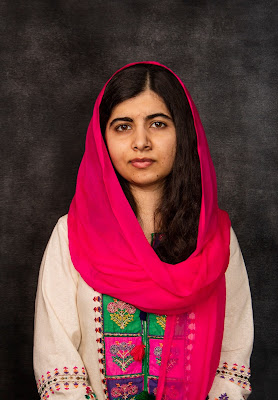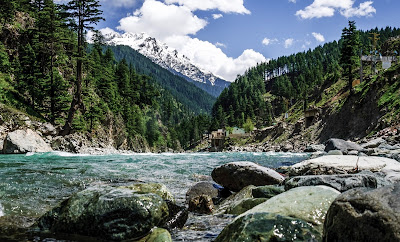Work and achievements of Malala Yousafzai
Introduction:
In the
early times, girls were excluded from receiving education. There were also not
given certain rights like the right to vote, driving, etc. Some of the rights are
still not given in some of the places. One of these places was the Swat Valley in Khyber Pakhtunkhwa, Northwest
Pakistan. It was under the control of the Pakistani Taliban, a terrorist
organization trying to overthrow the government of Pakistan. It banned girls
from going to school and also placed many restrictions on it. There was one
girl living there who stood up for this. Her name was Malala Yousafzai. She got
recognized all around the world and she was just a teenager. She is also the youngest Nobel Prize Laureate. She is now an
educational activist fighting for women’s education all around the world.
Main Content:
Malala
Yousafzai was born on July 12, 1997. Malala was a girl in a land where rifles
are fired in celebration of a son, while daughters are hidden away behind a
curtain, their role in life simply to prepare food and give birth to children.
But her father, Ziauddin Yousafzai was different than most
men. He told people, “I know there is something different about this child.”
She was named after Malalai of Maiwand, the greatest heroine of Afghanistan. In
high school, she read some Sherlock Holmes and laughed to see that this was the
same battle where Dr. Watson was wounded before becoming a partner to the great
detective. Her mother comes from a family of strong women as well as
influential men. Her father shares everything with his wife, telling her about
his day, the good and the bad. She teases him a lot and gives him advice about
who she thinks is a genuine friend and who is not, and he says she is always
right. Most men never do this, as sharing problems with women is seen as weak.
“He even asks his wife!” they say as an insult. Her parents are happy and she
sees them laughing a lot. People would see them and say that they are a sweet
family.
While boys
and men could roam freely about town, she and her mother could not go out
without a male relative to accompany them, even if it was a five-year-old boy.
This was the tradition. Her father always said, “Malala will be free as a
bird.” Her family runs a chain of schools in the Swat District. The Swat district was under the control of the Pakistani Taliban which banned girls from
attending schools in that region. All the girls going to schools in the region
became victims of this ban. Malala was one of them.
Malala knew from her father that weakness could be turned around as strength. Malala’s father was a stutter from birth but he entered the district’s annual public speaking competition during his middle school. He won the first prize and that motivated Malala very much later to fight for the rights of education for girls. That motivated him to start schools for children. He was a teacher, accountant, and principal. He also swept the floors, whitewashed the walls, and cleaned the bathrooms. He used to climb up electricity poles to hang banners advertising the school. Malala’s mother was very unusual in the village, as she had a father and brothers who encouraged her to go to school. She was the only girl in a class of boys.
Malala’s
father was an educational activist himself. He thought there was nothing more
important than knowledge. Education had been a great gift for him. He believed
that lack of education was the root of all of Pakistan’s problems. Ignorance
allowed politicians to fool people and bad administrators to be re-elected. Her
father was a great inspiration to her. She wanted to get into politics at a
very young age. She was also inspired by Muhammad Ali Jinnah, the founder of
Pakistan and the twice elected prime minister of Pakistan, Benazir Bhutto.
Malala was also influenced by Martin Luther King Jr. and Nelson Mandela.
She talked
about the importance of a girl’s education when she was very young. She says that
wearing a burqa is like walking inside a big fabric shuttlecock with only a
grille to see through and on hot days it’s like an oven. She was also a BBC
Blogger who wrote about her life. Her blogs made the happenings in the Swat
Region come to light all across the globe. This way, she got recognized as a
young teenager fighting for girls' education in Pakistan.
The situation of the Pakistani Taliban became worse. They have started destroying
schools in the region. The Taliban also came to know about Malala and her
activities. So, they wanted to subdue her. Schools were reopened once again in
the Swat region.
Her father
wrote her speeches earlier. In one of her speeches, he argued that if you want
to do good, but do it in a bad way, that’s still bad. In the same way, if you
choose a good method to do something bad it is still bad. He ended it with
Lincoln’s words: “It is far more honorable to fail than to cheat.” She was
used to coming top of her class. But later she realized that even if you win
three or four times, the next victory will not necessarily be yours without
trying—and also that sometimes it’s better to tell your own story. So, she
started writing her own speeches and changing the way she delivered them, from her
heart rather than from a sheet of paper. She persuaded her father to give free
education to a number of girls in his school. Although the school was not
really making money, her father gave away more than a hundred free places.
Though she
loved school, she had not realized how important education was until the
Taliban tried to stop them from going to school, reading, and doing homework.
She felt it was not just a way of passing time; it was her future. She wanted
people to know what was happening. Education is our right, she said. Just as it
is our right to sing. She spoke that Islam has given us the right and says that
every girl and boy should go to school. The Quran says we should seek
knowledge, study hard and learn the mysteries of our world. Malala became more
popular every day because of her activities. By now, Mala began to see that the
pen and the words that come from it can be much more powerful than machine
guns, tanks, or helicopters. Many death threats came to her in newspapers,
letters, and even on Facebook. The Pakistani Taliban were angered because of
their identity coming to light. They finally decided to track her and kill her.
While
Malala was traveling home from school by bus, it was stopped in the middle.
After a Taliban soldier recognized Malala on the bus, he shot her three times in the
face, neck, and shoulder. Two other girls traveling with her also got injured
by the attack but had their consciousness.
Upon this incident, she was immediately taken to Peshawar and Rawalpindi for her
treatment. Later, she was also taken to Queen Elizabeth Hospital, England.
Finally, the bullets were removed from her body. The Pakistani Government paid
for the transportation, migration, and other expenses for Malala’s treatment.
Malala
miraculously survived the incident. This incident made her even more famous to
the world. Her works inspired many people to think about girl’s education and
equality. Banning girls from education began to come to light by the works of
Malala Yousafzai. She was awarded Pakistan’s first-ever National Peace Prize. In
2014, at the age of 17, Malala became the youngest winner of the Nobel Peace
Prize. In 2015, Mala was a subject of the Oscar-shortlisted documentary He
Named Me Malala. 2013, 2014, and 2015, issues of Time magazine featured
her as one of the most influential people globally. In 2017, she was awarded
honorary Canadian citizenship and became the youngest person to address the
House of Commons of Canada.
Mala completed her secondary school education at Edgbaston High School, Birmingham in England from 2013 to 2017. From there, she won a place at Oxford University and undertook three years of study for a Bachelor of Arts degree in Philosophy, Politics and Economics (PPE), as an undergraduate at Lady Margaret Hall, Oxford a college of the university. She graduated in 2020. Presently, she has many plans for improving education and partnerships.
According
to Shri Karmayogi, founder of The Mother’s Service Society education is a key
to human development. Education communicates the experiences of the past to
subsequent generations in an abridged and condensed form, so that the youth of
today can build upon the entire past achievements of the society. As Former
Chief Minister of Tamil Nadu, Kamaraj said, "Educate a man, he will
develop himself." Without education, development in any area has a very
limited scope.
Mala, by fighting for the right to
education for the girls has laid the seeds not only for her generation but also
for the generations that follow.









0 Comments